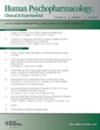Effects of Cannabinoids on Emotional States and Alcohol Use Among Underrepresented Groups: Moderation by Perceived Discrimination
Abstract
Objective
This study examined the effects of tetrahydrocannabinol (THC) and cannabidiol (CBD) on negative mood and drinking behaviors, and whether those effects were moderated by levels of perceived discrimination among participants who identify with a racial, ethnic, gender, or sexual identity that is underrepresented in research.
Methods
Participants were either not using cannabis, using cannabis with THC, or using cannabis with CBD and were assessed at baseline, 2 weeks, and 4-weeks following ad libitum use of a legal market cannabis product that was randomly assigned to them. Primary outcomes included scores on the Depression Anxiety Stress (DASS) Scale and number of drinking days. Moderation analyses used the Perceived Discrimination Scale (PDS).
Results
172 participants who were 62% female and mean age = 30.2 were included (not using cannabis = 20, using cannabis = 152; of those, THC = 96, CBD = 56). There were significant changes in DASS scores over time, with participants using CBD experiencing greater decreases in symptoms versus participants using THC. There was also a marginal conditionXtimeXPDS interaction that was significant when the condition not using cannabis was removed from the analysis. In this case, participants in the CBD and THC conditions shared a general linear trend of decreasing DASS total scores over time, but only at average (mean) and high (+1 SD) levels of PDS scores. There were no significant effects on alcohol-related outcomes.
Conclusions
CBD may be helpful in reducing negative emotional symptoms in the short term without increasing risk for disordered alcohol use, and perceived discrimination plays a significant role in this relationship.
Trial Registration
Clinicaltrials. gov (NCT03491384; Registration Date 2018-02-28); Open Science Framework

 求助内容:
求助内容: 应助结果提醒方式:
应助结果提醒方式:


